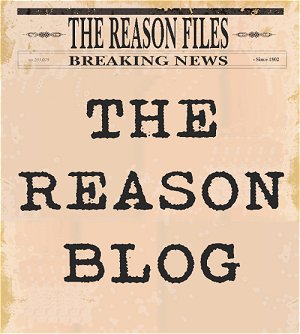by Robert Tuttle, III
Before I go on, I need to interject a brief word about embracing Satan, and “immoral sinners.” With regard to Satan, God, through His Word, makes it very clear – even explicitly so, that everyone, without exception, is affiliated with either Himself, or with Satan. And not simply affiliated, but a slave of. Yes, slavery still exists, both in the physical sense and also in the spiritual sense. Spiritually speaking we are all, again without exception, slaves. We are either slaves of God – because He purchased Christians with the very blood of His Son, Jesus Christ; or, we are slaves of Satan, because we have rejected God. These are the only two options. The only real question is, who is your master?
With regard to “immoral sinners,” I mean immoral in the sense of not thinking or behaving in a moral manner; with moral referring to the Ten Commandments. In the way of a brief refresher, they are: 1. There is only one true God, the God of the Bible, don’t replace Him with a false god; 2. Do not make idols and bow down to them; 3. Don’t blaspheme God; 4. Remember the Sabbath – have a day set aside each week to rest and worship the One True God; 5. Honor your parents; 6. Don’t murder; 7. Don’t commit adultery; 8. Don’t steal; 9. Don’t lie; 10. Don’t desire either the spouse or possessions of others. So when I say “immoral sinners,” it is almost a redundant phrase because all sinners, by definition, have violated God’s objective morals and are, therefore, both immoral and sinners.
Along with true Biblical repentance and all that it entails is the command to embrace God. The embracing of, or loving God, is demonstrated by exhibiting a loving obedience to His commands: “6 Seek the Lord while He may be found; call upon Him while He is near. 7 Let the wicked forsake his way, and the unrighteous man his thoughts; and let him return to the Lord, and He will have compassion on him, and to our God, for He will abundantly pardon.” (Isaiah 55:6-7 NASB95). Now is the time to get out your Bibles, or find one, and read: James 4:7; Matthew 7:21; Luke 11:28; John 3:36; John 14:15,21,23-24; 15:10; and Acts 17:30-31, which I will include here:
“30 Therefore having overlooked the times of ignorance, God is now declaring to men that all people everywhere should repent, 31 because He has fixed a day in which He will judge the world in righteousness through a Man whom He has appointed, having furnished proof to all men by raising Him from the dead.”
So back to Christianity. In addition to mandatory repentance, what is also mandatory for salvation is a sincerely held belief in the gospel. Jesus said in Mark 1:15, “The time is fulfilled, the Kingdom of God is at hand; REPENT! and BELIEVE IN THE GOSPEL!” (NASB77, emphasis mine). What exactly is the gospel? What must we believe to have salvation from our enslavement to Satan and immoral sin? We find the basic “brass tacks” explanation of the gospel in 1 Corinthians chapter 15, verses 3-8 which present to us the gospel, almost in list form of what we must truthfully and sincerely completely believe to be true. That list is:
1. That Jesus Christ died for our sins, just as the Old Testament revealed He would be;
2. That He was buried;
3. That He bodily rose from the dead, three days after He died;
4. That after His resurrection from the dead, He appeared bodily to the Twelve Apostles;
5. That He then appeared bodily to more than 500 eyewitnesses (many of whom were still alive when 1 Corinthians was written);
6. That He then again appeared bodily to the Apostles;
7. That He then appeared to Paul who was the last Apostle personally chosen as an Apostle by Jesus Christ Himself.
“9 if you confess with your mouth Jesus as Lord, and believe in your heart that God raised Him from the dead, you shall be saved; 10 for with the heart man believes, resulting in righteousness, and with the mouth he confesses, resulting in salvation.”
Now, before anyone jumps up and yells “Jesus is Lord!” and think they have salvation, remember that one must also agree in their spirit, their inner person, where truly and sincerely held beliefs are found. And one cannot agree that Jesus is Lord unless they first understand what Lord means. Hint: It doesn’t simply mean “boss of my life” as many people believe it does. The word is translated from the Greek word Kurios (koo'-ree-os), which means “lord,” as in one exercising full and sovereign authority over. It also means “master,” as in one who has complete and absolute ownership rights. Think both sovereign monarch, and also slave owner. Yes, I agree that “slave owner” sounds like a very harsh, cruel, and unloving thing to say about Jesus; however, given that He literally purchased every single person who biblically believes in Him and their redemption with His very blood, it isn’t too much of a stretch to realize that yes, He owns each and every true biblical Christian.
The third key phrase that must be understood is “believe in your heart.” This phrase in the Greek is “pisteusēs en tē kardia” which is literally translated as “believe in the heart.” The word believe, and I want you all to understand this as it is very important to gaining salvation, the word believe is used in the New Testament of “the conviction and trust to which a man is impelled by a certain inner and higher perogative and law of his soul.”1 Therefore, what Romans 10:9 is referring to with this word, is the absolute conviction that what follows in the text (namely the gospel) is completely and unquestioningly true, that God really and truly raised Jesus Christ bodily from the dead.
The word translated as “heart” is “kardia” from which we get our word cardiology as well as a number of heart related terms beginning with the prefix cardi. In English, the term most often refers to the powerful chambered organ in the center of our chest that pumps life sustaining blood throughout our bodies. But not so in the New Testament. Of the some 800 or so times it is used in the New Testament the word kardia never refers to the human organ. Instead it always refers to the center of who we are as a person. That unseen part of us that contains our beliefs, preferences, desires, opinions, ability to make decisions, and so forth. Our mind, our soul if you will. It is who we are beyond the physical body we inhabit. It is therefore absolutely necessary, as in a mandatory, non-negotiable requirement to salvation, that we “pisteusēs en tē kardia,” believe in the heart, our soul, that God raised Jesus Christ bodily from the dead – essentially believe the gospel as absolutely and completely true.
This is a lot to take in! Clearly though, the Bible obviously refutes the commonly held belief among most people that if we say some little pray where we intellectually acknowledge that we are a sinner, and say the words “Jesus forgive me” (or some iteration of that) and ask Him “into your heart” (whatever that means, as it is nowhere in the Bible) then the person will be saved. That is a false gospel that inevitably leads people into believing they say that little “repeat-a-prayer” and then live however they might want to live, in whatever sin they might desire, and still enter heaven. That is the heresy of antinomianism by the way.
No, we must remember the very words of Almighty God, who very plainly and bluntly stated, “He who believes in the Son has eternal life; but he who does not obey the Son shall not see life, but the WRATH of God abides on him.” (John 3:36 NASB77, emphasis mine).
Obedience to God, to Jesus, while not necessary to receive salvation, it is the natural and biblically guaranteed result of having salvation from immoral sin and the wrath of God coming upon all immoral sinners. Obedience is the evidence of salvation. As God points out in John 3:36, if there is not obedience to Jesus, then there is no salvation; and, if there is no salvation then those who continue in their sinful immorality have nothing to look forward to other than spending the remainder of eternity in hell, the lake of fire, where the fire is never quenched and the worm never dies. A place of eternal torment, of weeping and gnashing teeth, where the unregenerate are punished eternally for their sins against the eternal God. (see Matthew 25:41,46; Mark 9:47-48; Luke 13:24-28; Matthew 13:40-43; Revelation 19:20; 20:10,14,15; and 21:8). I think the absolute horror of it is simply not grasped by a lot of people.
I sincerely applaud you if you have held on to the end of this rather long (and long winded) second half of this two-part “How Can This Happen in America?” article series. I apologize for being long winded, but I wanted to make sure that you, Dear Reader, have a full and complete understanding of this eternally important subject.
1. THAYER'S GREEK LEXICON, Electronic Database.; Copyright © 2002, 2003, 2006, 2011 by Biblesoft, Inc.; All rights reserved. Used by permission. BibleSoft.com


 RSS Feed
RSS Feed
